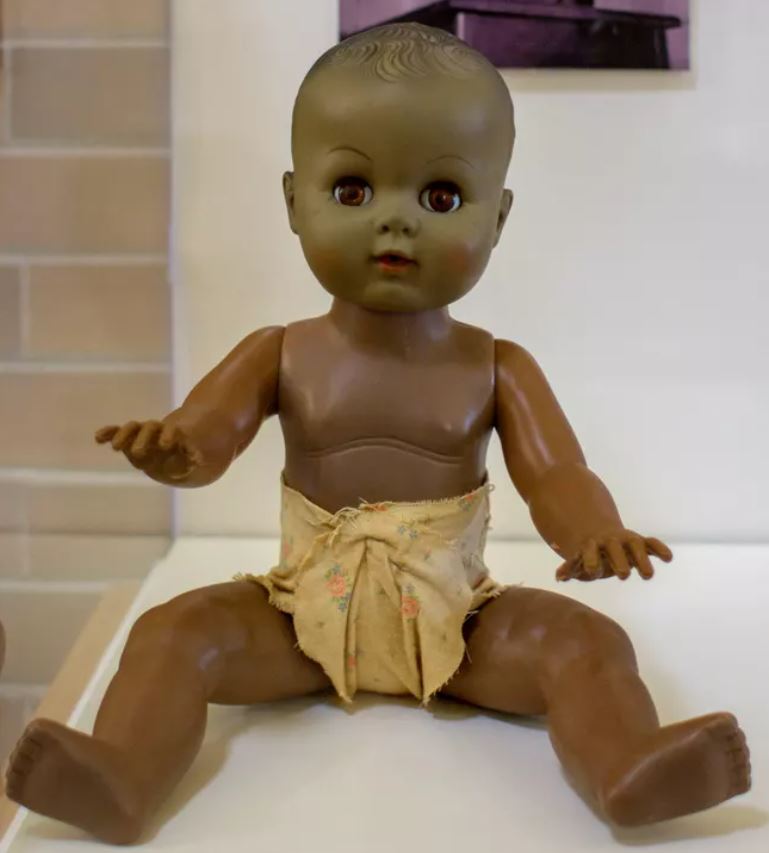On view through June 2, 2024
Curated by Karl J. Flesch
Scroll down for events in April to celebrate, create, and explore dolls and the people who make them
“Dolls. They are a child’s first introduction to self-image; their stories are key elements in our personal heritage. Across all cultural backgrounds, everyone has a story that dolls can tell. The history of Black dolls is about more than just objects of play.
Black dolls have played a critical role in building a diverse American society and rich African American culture. They help tell the stories of African-American history, of enslaved Africans captured and relocated to a strange land and yet bravely asserting their own cultures—and of everyone who came after.”
Horsman Dolls

Rosebud: 21”, Rare black version from 1940’s. (Collector’s Guide to Horsman Dolls 1865-1950)
The Horsman firm was founded in 1865 in New York City. The company made and sold games and homemade amusements. The beginning of the Horsman Dolls brand identity probably dates to 1897, when the company adopted a banner type label identifying Horsman Art Dolls, and including its logo, an outline of a centaur, part horse, part man.
Babyland Rag Dolls, a series of cloth dolls, appeared in the company’s 1893 catalog. In the series was a Black Babyland, date unknown. Various black dolls were created over the years by Horsman.
The Horsman doll company would be purchased at the end of 1932 by the Regal Doll Company, whose factory in Trenton occupied an entire block bound by Adeline, Chestnut, Grand and Elm streets.
The company would produce millions of dolls a year in Trenton until 1960, when labor costs had become a serious problem. Horsman closed the Trenton factory, and moved to a new, spacious, non-union facility in South Carolina.
Today, what remains of the once dominant doll company is known as Horsman LTD., based in Redwood City, CA. It is a web company as well as an agent company for companies in the U.S. that need overseas production sourcing.
Black Horsman Dolls
Black Horsman Dolls Exhibit
New-York Historical Society Museum & Library

Doll in gentleman’s top coat, 1860-70. Milton, MA. Mixed fabrics, leather, brass, glass. Deborah Neff Collection. Photo: Ellen McDermott Photography (New-York Historical Society Museum & Library)
The New York Historical Society’s Black Dolls exhibit (2/25/2022 – 6/5/22) explored handmade cloth dolls made primarily by African American women between 1850 and 1940 through the lens of race, gender, and history. The exhibit immersed visitors in the world of dolls, doll play, and doll making while examining the formation of racial stereotypes and confronting the persistence of racism in American history. It featured more than 100 cloth dolls, alongside dozens of historical photographs of white and Black children posed with their playthings and caregivers. A coda explored 20th-century commercial dolls marketed to a broader audience of Black families seeking to instill pride in their children. Through these humble yet potent objects, Black Dolls revealed difficult truths about American history and invited visitors to engage in the urgent national conversation around the legacy of slavery and race.
Curated by Margaret K. Hofer, vice president and museum director, and Dominique Jean-Louis, associate curator
Black Dolls (If These Dolls Could Talk – The Hidden History of Black Dolls)
Brown V. Board of Education, National Historic Park, Kansas

One of four dolls, two black and two white, used in the experiment conducted by Dr.s Kenneth and Mamie Clark that would later be used in Brown v. Board of Education. NPS Photo by Visual information Specialist Preston Webb.
Children’s toys aren’t usually talked about by the U.S. Supreme Court. Yet a set of baby dolls – two black, two white – played a key role in what many consider the most important legal ruling of the 20th century.
In the 1940’s, psychologists Kenneth and Mamie Clark designed and conducted a series of experiments known colloquially as “the doll tests” to study the psychological effects of segregation on African American children.
Kenneth and Mamie Clark Doll: The Doll’s Story
Brown v. Board and “The Doll Test”
Segregation and Desegregation of Trenton’s Schools
Let’s get together to explore and celebrate the world of dolls with these upcoming events
LABOR PAINS – Workers’ Experiences in Horsman’s Trenton Plant
Lecture by Curator Karl J. Flesch
Sunday, April 14, 2-3 pm
HELLO, BEAUTIFUL! A Celebration of Black Doll Collectors
Saturday, April 6, 1-3 pm
FAMILY DOLL-MAKING WORKSHOP
Sunday, April 7, 1-3 pm




